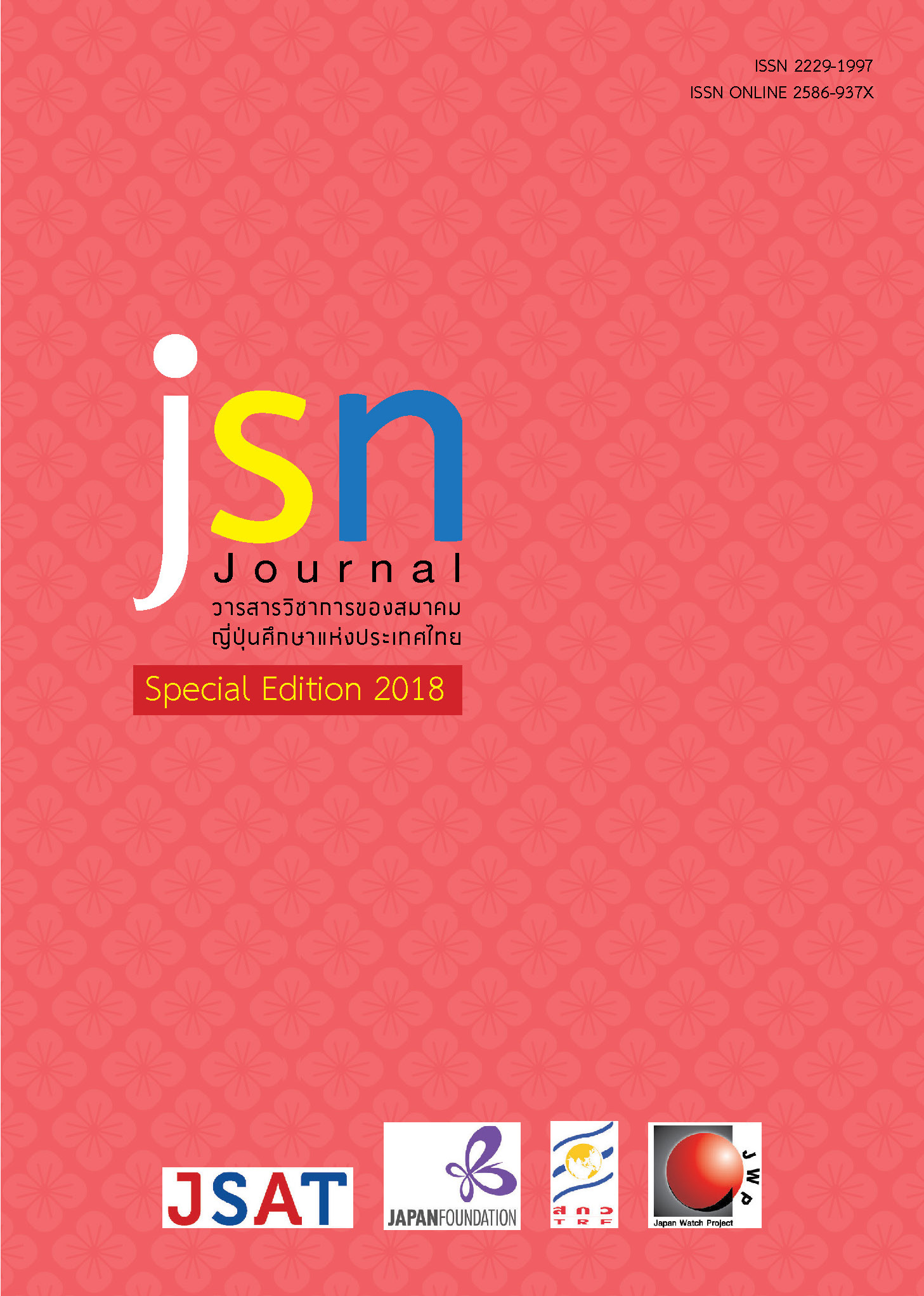Careers for Japanese Majors and Career Readiness: Case Study Topics for First- and Second-year Students
Main Article Content
Abstract
The present study has two objectives 1) to survey the current situation and trend of careers for Japanese majors; and 2) to survey the career readiness of students studying Japanese. The research methods adopted in this study were documentary research for the first objective; and observation, questionnaires, and interviews regarding two experimental workshops, “My life from now on” and “CV for a career development plan.” These workshops were organized for first- and second-year students majoring in the Japanese language at a national university. The participants of this study were seventy-four students studying Japanese. The results of the study showed that the demand for Japanese majors is expanding in Japan, according to Japan’s labor shortage and the new policy to accept foreign workers. The top-3 careers for graduates who know Japanese were, translator and interpreter, sales and marketing staff, and international coordinator. The top-3 essential skills for graduates in the humanities and social sciences were communication skills, Japanese language skills, and cooperativeness. The results of the first workshop, “My life from now on,” indicated that the participants expected to work in order to be able to enjoy their personal interests but no action plans to accomplish their goals were stated. The results of the second workshop, “CV for a career development plan,” showed that the students understood their own career needs but very few could identify the strengths that would lead to their success. In order to help the students improve their self-awareness and growth mindset, an environment that promotes the sharing of ideas with others via dialogue, and developing strategic action plans that are aligned with their goals, should be encouraged by instructors continually so that education can respond to labor market needs.
Article Details
ข้อความและข้อคิดเห็นต่างๆ ในบทความเป็นของผู้เขียนบทความนั้นๆ ไม่ใช่ความเห็นของกองบรรณาธิการหรือของวารสาร jsn Journal
References
Lave, J. & and Wenger, E. (1991). Situated Learning: Legitimate Peripheral Participation. Cambridge: Cambridge University Press.
経済産業省委託事業 (2017).「外国人留学生の就職及び定着状況に関する意識調査」新日本有限責任監査法人 Retrieved from file:///C:/Users/Dell_001/Dropbox/文献/留学生/平成28年度産業経済研究委託事業%20.pdf
近藤彩 (2014).「日本語日母語話者と母語話者が学びあうビジネスコミュニケーション教育―ダイバーシティの中で活躍できる人材の育成に向けて」『専門日本語研究』16巻,15-22.専門日本語教育学会.
ディスコ キャリタスリサーチ (2017).「外国人留学生/高度外国人材の採用に関する企業調査」Retrieved from https://www.disc.co.jp/wp/wp-content/uploads/2017/12/2017kigyougaikoku-report.pdf
日本貿易振興機構(ジェトロ)(2017).「タイ日系企業進出動向調査 2017年」Retrieved from https://www.jetro.go.jp/ext_images/_Reports/01/762117c2abed4a1c/20170074_summary.pdf
法務省入国管理局 (2017).「平成28年における留学生の日本企業等への就職状況について」Retrieved fromhttp://www.moj.go.jp/nyuukokukanri/kouhou/nyuukokukanri07_00157.html
細川英雄 (2017).「キャリアデザインのための自己表現とバイオグラフィ」 細川英雄・太田裕子編著『キャリアデザインのための自己表現―過去・現在・未来を結ぶバイオグラフ 』1-6, 東京図書.
文部科学省 (2017).「外国人留学生の就職促進について(外国人留学生の就職に関する課題等)Retrieved from https://www.jasso.go.jp/gakusei/career/event/guidance/__icsFiles/afieldfile/2017/07/04/12_h29guidance_ryuugakusei-session_monkasyou.pdf
山路尚武 (2017).「インターンシップの拡大に向けた施策について」文部科学省. Retrieved from https://career-edu.nikkeihr.co.jp/Career/disp/seminar_13_03.html
山本晋也 (2017).「過去・現在・未来を描く―留学生のキャリアデザインを考える」細川英雄・太田裕子編著『キャリアデザインのための自己表現―過去・現在・未来を結ぶバイオグラフィ』68-85. 東京図書.


